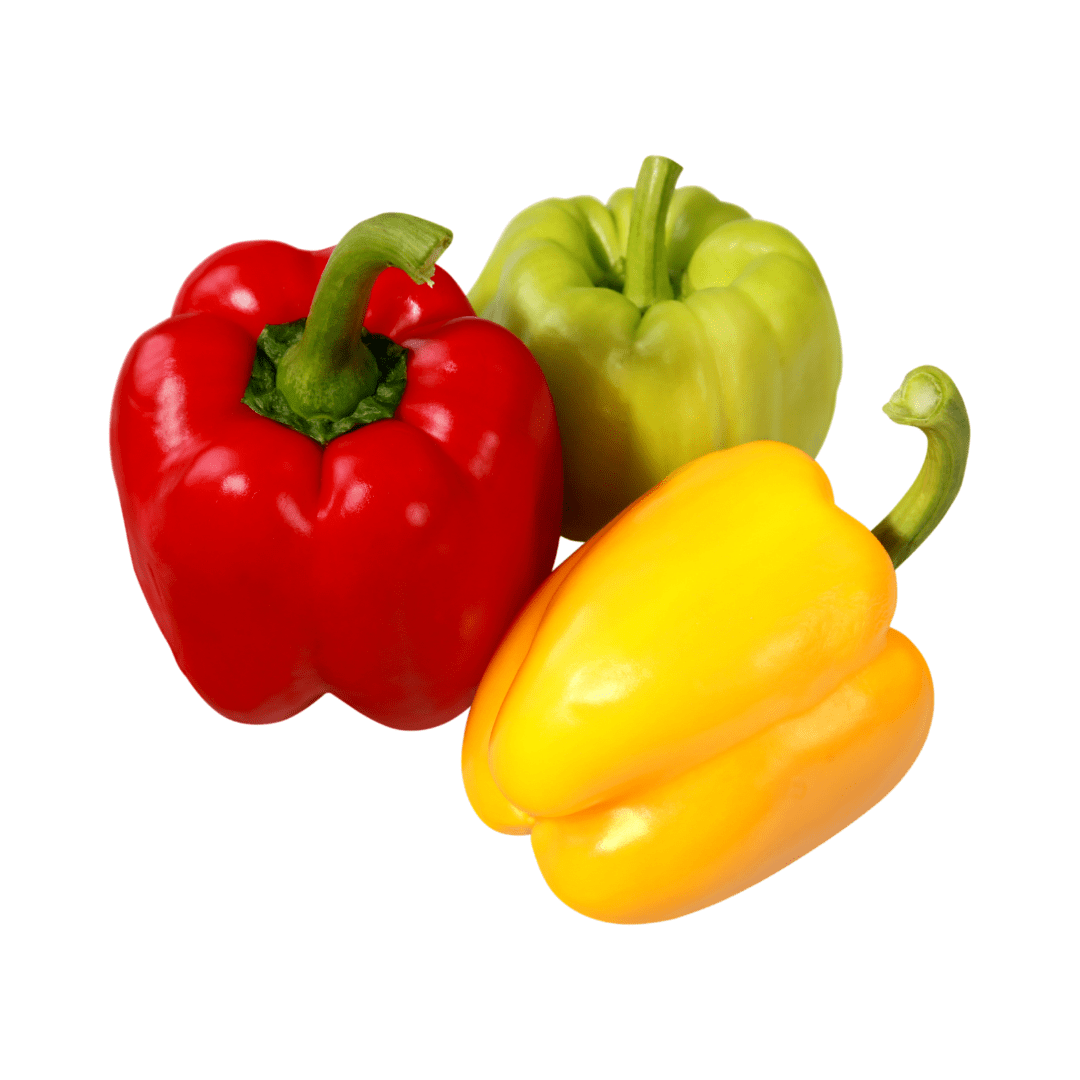About
Bell Pepper, also known as sweet pepper, is a fruit that is part of the Capsicum annuum species. It is a popular ingredient in many dishes due to its sweet, mild flavor and crisp texture. Bell peppers come in various colors, including green, red, yellow, and orange.
Health Benefits of Bell Pepper:
-
High in Nutrients: Bell peppers are low in calories but high in nutrients. They are an excellent source of vitamin C, vitamin A, and potassium.
-
May Improve Eye Health: Bell peppers contain carotenoids such as lutein and zeaxanthin, which can help prevent age-related macular degeneration and cataracts.
-
May Aid Digestion: Bell peppers are rich in fiber, which promotes healthy digestion and can help prevent constipation.
-
May Reduce Inflammation: Bell peppers contain antioxidants that can help reduce inflammation in the body, which may lower the risk of chronic diseases such as heart disease and cancer.
-
May Promote Weight Loss: Bell peppers are low in calories and high in fiber, which can help you feel full and satisfied, making it easier to stick to a healthy diet.
List of Diseases that can be cured:
Although bell peppers cannot cure diseases, they contain nutrients that can help prevent or manage certain conditions. Some of the diseases that may be prevented or managed by consuming bell peppers include:
- Cardiovascular Disease
- Cancer
- Diabetes
- Obesity
- Inflammatory Bowel Disease
Nutritional Content of Bell Pepper:
Energy and Macronutrient Content of Bell Pepper per 50g serving
| Nutrient | Amount per Serving |
|---|---|
| Calories | 9.5 |
| Carbohydrates | 2.1g |
| Fiber | 0.6g |
| Protein | 0.4g |
| Fat | 0.1g |
| Water | 46g |
Vitamin Content of Bell Pepper per 50g serving
| Nutrient | Amount per Serving |
|---|---|
| Vitamin A | 383 IU |
| Vitamin B1 (Thiamin) | 0.02mg |
| Vitamin B2 (Riboflavin) | 0.02mg |
| Vitamin B3 (Niacin) | 0.3mg |
| Vitamin B6 | 0.08mg |
| Vitamin B12 | 0mcg |
| Vitamin C | 37.5mg |
| Vitamin D | 0mcg |
| Vitamin E | 0.2mg |
| Vitamin K | 4.4mcg |
| Folate | 8.5mcg |
| Biotin | 0.45mcg |
Mineral Content of Bell Pepper per 50g serving
| Nutrient | Amount per Serving |
|---|---|
| Calcium | 4mg |
| Iron | 0.2mg |
| Iodine | 0mcg |
| Zinc | 0.1mg |
| Magnesium | 5mg |
| Phosphorus | 8mg |
| Potassium | 82mg |
| Sodium | 1mg |
| Chloride | 10mg |
| Copper | 0.02mg |
| Chromium | 0mcg |
| Fluoride | 0.3mcg |
| Molybdenum | 0.6mcg |
| Manganese | 0.03mg |
| Selenium | 0.2mcg |
What are the health benefits of bell peppers?
Bell peppers are rich in vitamins A, C, and E, as well as antioxidants. They can support immune function, promote healthy skin, and contribute to eye health.
How to cook bell peppers in different ways?
Bell peppers can be cooked by grilling, roasting, sautéing, or stuffing them. These methods enhance their flavors and textures, making them versatile for various recipes.
Are bell peppers rich in vitamins and minerals?
Yes, bell peppers are packed with vitamins A, C, and E, as well as minerals like potassium and folate. They are a nutritious addition to a balanced diet.
Can bell peppers be eaten raw?
Absolutely! Bell peppers can be enjoyed raw as a crunchy and refreshing snack or added to salads for a burst of color and flavor.
How to choose ripe bell peppers at the grocery store?
Look for bell peppers that have a firm and glossy skin, without any wrinkles or soft spots. They should feel heavy for their size.
Are there different colors of bell peppers and any nutritional differences?
Yes, bell peppers come in various colors such as red, green, yellow, and orange. While their flavors may vary slightly, the nutritional differences are minimal.
How to store bell peppers to keep them fresh?
Store bell peppers in a cool and dry place, preferably in the refrigerator. Place them in a plastic bag or container to retain their freshness.
Are bell peppers suitable for various diets like vegan or gluten-free?
Yes, bell peppers are suitable for vegan, vegetarian, and gluten-free diets. They are versatile ingredients in many plant-based and allergen-friendly recipes.
What are the different ways to incorporate bell peppers into meals?
Bell peppers can be added to stir-fries, pasta dishes, soups, omelets, sandwiches, and even pizza toppings. They add flavor, texture, and vibrant colors to meals.
Can bell peppers be used in salads and stir-fries?
Absolutely! Bell peppers add crunch, sweetness, and a pop of color to salads and stir-fries. They are a versatile ingredient that complements various flavors.
Are bell peppers a good source of antioxidants?
Yes, bell peppers are rich in antioxidants such as vitamin C and beta-carotene. These antioxidants help protect the body against harmful free radicals.
How to grow bell peppers in a home garden?
Bell peppers can be grown in a home garden by planting seeds or seedlings in well-draining soil, providing adequate sunlight and water, and protecting them from extreme weather conditions.
When is the right time to harvest bell peppers?
Bell peppers can be harvested when they reach the desired size and color. For most varieties, they are ready to be picked when they are fully ripe and firm.
Are there any specific tips for cooking with bell peppers?
One tip is to remove the seeds and white pith inside the bell peppers before cooking to reduce bitterness. Additionally, cooking them until slightly tender while retaining some crunch enhances their flavors.
Can bell peppers be frozen for later use?
Yes, bell peppers can be frozen for later use. It is recommended to blanch them briefly in boiling water, cool them in an ice bath, and then freeze them in airtight containers or freezer bags.
What are the potential health benefits of consuming bell pepper regularly?
Regular consumption of bell peppers can support immune function, promote healthy skin, aid digestion, contribute to heart health, and provide essential vitamins and minerals.









